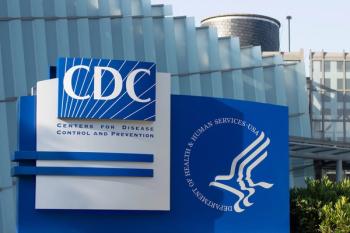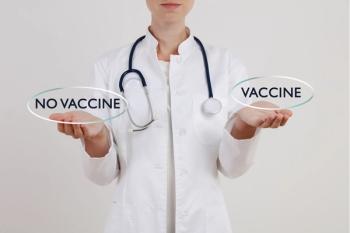
Addressing Vaccine Hesitancy and Gaps in Care
Jason Lee, M.S., Ph.D.(c), and John J. Russell, M.D., address vaccine hesitancy and gaps in influenza vaccines in adults.
Episodes in this series

Jason Lee, M.S., Ph.D.(c): Dr. Russell, seasonal influenza is obviously a huge source of morbidity and mortality for seniors each year. Although it has been down the last couple of years due to COVID-19, what we’re seeing from the southern hemisphere is that it’s likely to come back quite strongly this fall. How important is it to address the issue of vaccine hesitancy and educate patients on the importance of the influenza vaccine?
John J. Russell, M.D.: It’s very important. In primary care, this is what we do. This is primary prevention of disease. One of the things that is important is a strong endorsement from the clinician who’s caring for them. It’s helpful if I say, “I get the flu vaccine every year. This is why I think it’s important,” and then go from there. I talk about how people who are vaccinated against influenza are less likely to have an MI [myocardial infarction] in the three days after they’re infected with influenza. They’re much less likely to have a stroke. They’re less likely to be hospitalized. There are so many benefits to talk about. But it needs to start with a strong personal endorsement from someone they trust.
There are all kinds of things about people mistrusting science and things like that. However, I don’t think the relationship with someone’s personal clinician has eroded. That strong personal endorsement helps, along with sharing your narrative. In the United States, most of us who are patient-facing clinicians get vaccinated every year. We should share that story. I get vaccinated. It’s important for my parents, my children, and my spouse to get vaccinated. These are very important. If I give a lukewarm, wishy-washy type of recommendation, someone’s going to see through that.
Being proponents, we shouldn’t make it difficult to get a flu shot. In my office, my nursing staff knows that I’m vaccinating people during the flu season. If a patient is waiting for me, offer the flu shot and give the flu shot. I’ve also stipulated that. We have a variety of flu shots. We’re talking about one particular variety. I have it stratified in my office that different people can get that, and they can give that before I even come in the room. That avoids the patient saying, “I have to run, I’ll get a vaccine another time.” They’re getting that vaccine as they’re waiting for me.
It’s important to set the tone as an office that we’re here to give vaccines. My office for the last two seasons has done a drive-up flu clinic, and we’re going to do it this fall. It has been a great thing when people have hesitancy about coming into the office with worries about COVID-19. We’ve felt the drive-up clinic to be great customer service. We do it on a Saturday morning. People drive up, we give them the flu shot, we have them hold on for a few minutes to make sure everything’s OK, and they drive on. It has been a wonderful, forward-thinking way to get an important medical intervention to my patients.
Jason Lee, M.S., Ph.D.(c): It’s great how you’re able to implement this proactive approach to vaccinations in your own practice. With the last few years being stuck with COVID-19, there’s certainly a degree of COVID-19 fatigue that we’re all experiencing. How would you recommend clinicians be able to have those types of discussions with their patients, especially for people who aren’t as interested in getting any more vaccines for the next little while?
John J. Russell, M.D.: Often, the people who get flu vaccines tend to be people who get flu vaccines. Sometimes it’s hard to convince that person who’s never gotten a flu vaccine. We’re talking about seniors. The majority of seniors in the United States get a flu shot every year. For the most part, it’s probably the same group of people who get it each year. For some people, there’s less convincing.
Last year, there was a little more flu than the year before. The flu didn’t go away. In 2021, we saw a peak of RSV [respiratory syncytial virus] in May. That’s life finding a way, that flower growing up between the cracks in the sidewalk. Viruses are waiting to have that opportunity. In the southern hemisphere, we’re seeing a decent amount of influenza. To some of the people who thought, “We haven’t seen a whole lot of influenza the last two years, it must’ve gone away,” there’s a certain naiveté to that. A lot of that going away has been social distancing and masking and all the stuff that we did in 1918 to protect people from getting influenza when we didn’t have vaccines or treatments.
It’s still important to talk about it. There are still barriers. If you look at the senior population over the last 15 years, we’ve lived in that 60% to 70% range for vaccine uptake, and that number hasn’t moved a whole lot. We need to think about what the issues are for that 30% of the population and how we can move them off that. Sometimes it takes a village. I mentioned cardiovascular risk. Maybe they aren’t going to listen to their primary doctor about the risk to their heart from getting influenza, but they might listen to their cardiologist. They might not listen to me about their stroke risk, but maybe they would listen to their pulmonologist or neurologist about all these different things. These are the things to talk about.
It takes a village. We carry influenza vaccines in our office. It probably makes sense for our obstetrical colleagues to carry vaccines in their office, along with cardiologists, etc, to make it as easy as possible. Vaccinating patients while they’re in the hospital prior to being discharged during flu season can help. Let’s get you vaccinated.
Jason Lee, M.S., Ph.D.(c): You mentioned there is a small group of individuals who are still getting standard-dose influenza vaccine each year. What insights do you have about that group? Are there any sociodemographic or other types of factors that affect what type of influenza vaccine people are getting in the United States each year?
John J. Russell, M.D.: If you look at the senior population in the United States, the majority of seniors who get a flu vaccine will get a high-dose flu vaccine. It has already become what people know to ask for. It might be that for some clinicians, it’s a complicated thing and it’s easier for them to have a one-size-fits-all, and it’s easier for them to have one vaccine in their fridge, but I don’t think that’s the right thing. We stratify. We might pick different blood pressure medicines based on different demographics of the people we’re taking care of. Vaccines are part of that. We shouldn’t be afraid to stratify by risk or by age and do different vaccines.
There are early adopters—I was a very early adopter of the high-dose flu vaccine—and there are some people who are slow adopters, and hopefully it will get to them. But if someone is going to get vaccinated and there’s a high-dose flu vaccine available, I’d highly recommend that they get a high-dose flu vaccine as opposed to a standard. If you’re in a community and the only flu vaccine available is a standard dose, I’d get that because that’s still better than not getting vaccinated.
Transcript edited for clarity
Newsletter
Stay informed and empowered with Medical Economics enewsletter, delivering expert insights, financial strategies, practice management tips and technology trends — tailored for today’s physicians.







